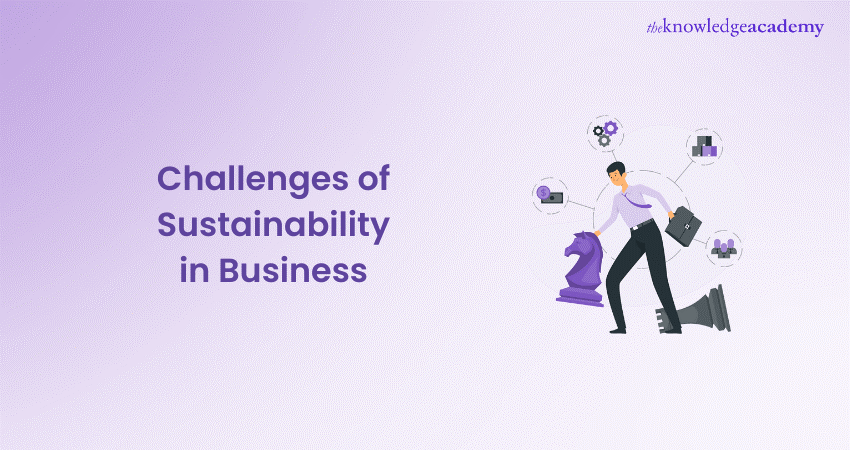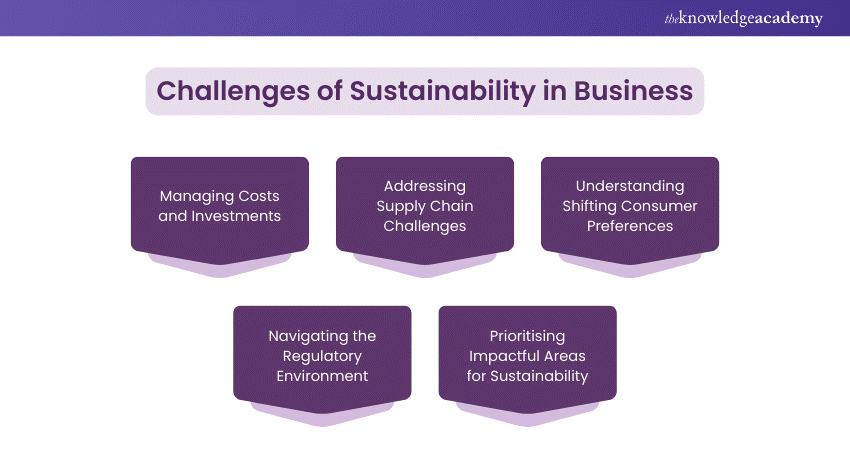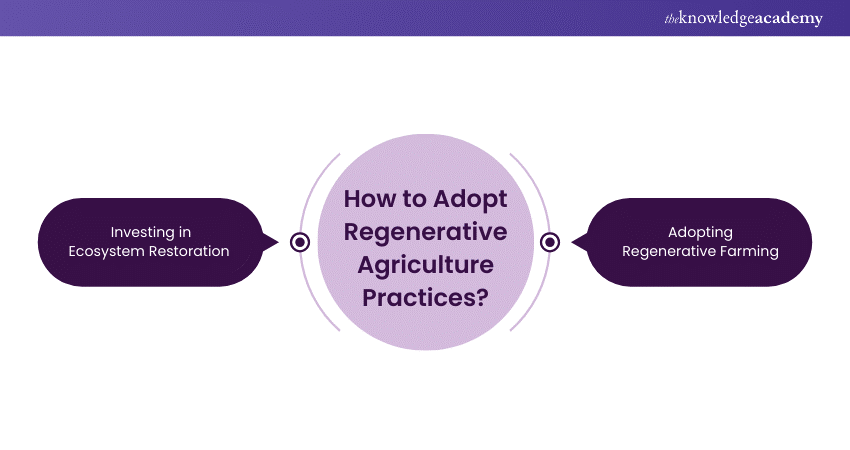We may not have the course you’re looking for. If you enquire or give us a call on +45 89870423 and speak to our training experts, we may still be able to help with your training requirements.
Training Outcomes Within Your Budget!
We ensure quality, budget-alignment, and timely delivery by our expert instructors.

Have you ever wondered why so many businesses struggle with sustainability despite its growing importance? The Challenges of Sustainability in Business are vast and multifaceted. It ranges from high costs and complex supply chains to stringent regulations and fluctuating consumer demands.
These challenges are not just roadblocks but can significantly affect a company's operations and profitability. Each hurdle, whether financial, logistical, or regulatory, needs to be carefully managed to maintain both economic viability and environmental responsibility.
What if these challenges could be transformed into opportunities for innovation and growth? By understanding the key obstacles and how to address them, businesses can not only comply with regulations and meet consumer expectations but also gain a competitive advantage and build a resilient, sustainable brand.
Curious to learn more about overcoming the Challenges of Sustainability in Business? Read on as we delve into the complexities and offer practical solutions for integrating sustainability into your business strategy.
Table of Contents
1) What is a Sustainability Business?
2) The Challenges of Sustainability in Business
a) Managing Costs and Investments
b) Addressing Supply Chain Challenges
c) Understanding Shifting Consumer Preferences
d) Navigating the Regulatory Environment
e) Prioritising Impactful Areas for Sustainability
f) Implementing Effective Transformation Strategies
g) Securing Funding for Sustainability Initiatives
h) Transitioning to Sustainable Energy Sources
i) Embracing Circular Economy Principles
j) Promoting Diversity, Equity, and Inclusion
3) Conclusion
What is a Sustainability Business?
Business sustainability is also known as “green business.” It is the practice of operating a company while underrating its negative impact on the environment. These kinds of businesses act in the best interests of the local and global conditions.
These sustainability practices come at an extra cost to companies. It can guarantee the compliance of its employees, invest in eco-friendly infrastructure, and switch to more expensive, sustainable resources. They can also adapt to other traditional ways of conducting their day-to-day operations.
The Challenges of Sustainability in Business
One of the biggest issues firms deal with is implementing the concept of sustainability into business. Many business owners strive to enhance their sustainability. They aspire to run a greener workplace and understand its benefits.
Many business owners struggle with this transition from their operations to being green. They face several sustainability challenges. Let's discuss a few challenges.

1) Managing Costs and Investments
Businesses often struggle to identify where they can make the most significant impact on sustainability. It’s crucial to prioritise initiatives that will have the greatest positive effect on the environment and society.
Sustainability transformations often require significant investments. Therefore, you must find ways to finance these changes without compromising their financial stability. One thing you could consider is installing a solar panel. The initial cost and instalment are going to be expensive no matter what. But over the years, you’re going to become more energy efficient.
2) Addressing Supply Chain Challenges
Whether you are running a business or setting one up, Supply Chain Management can be difficult. Many can’t always trace where the raw materials come from. It’s particularly hard for small or medium-sized businesses to develop a strong supply chain model if larger suppliers do not pay attention to your demands or requests.
The biggest challenge ultimately lies in transparency. Finding suppliers willing to disclose their practices, including manufacturing processes, raw materials, waste reduction efforts, and commitment to developing ESG-conscious end products, proves to be a formidable task.
Do you want to become familiar with the trends and new ideas of ethics and corporate governance? Join our Business Sustainability Course now!
3) Understanding Shifting Consumer Preferences
As demand for sustainable products grows, a key challenge emerges. And that is, balancing sustainability with competitive pricing. Many consumers hesitate to pay extra for sustainability unless they strongly favour a particular brand. Therefore, to reach a broader market, businesses must develop credible models that prioritise sustainability without relying solely on niche marketing strategies.
4) Navigating the Regulatory Environment
As global regulations push companies towards sustainability, the scrutiny on actual sustainability practices intensifies. Becoming B-certified requires meeting high standards, which are continuously evolving. Companies striving for sustainability must not only focus on their practices but also understand what sustainability entails in their daily operations.
5) Prioritising Impactful Areas for Sustainability
Leadership teams often struggle to prioritise aspects of sustainability. So, to get a competitive edge, organisations must prioritise environmental, social, and governance initiatives across the board, not just isolated efforts. This requires a thorough, organisation-wide transformation, embedding ESG principles into every aspect of operations for meaningful impact.
6) Implementing Effective Transformation Strategies
To effectively implement such transformation, companies need a strong engine encompassing leader enablement, employee engagement, and execution certainty. Leaders must be aligned and incentivised based on ESG performance while engaging the entire workforce through clear communication and upskilling opportunities.
Rigorous execution demands strong governance and consistent tracking, managed by a dedicated transformation office. This integrated approach ensures lasting change aligned with financial goals.
Learn how to develop a continuous improvement plan and schedule with our Business Process Improvement Training - Register today!
7) Transitioning to Sustainable Energy Sources
There are still many people who don't have access to electricity and gas. They cook with the help of fossil fuels and use it for electricity. Therefore, companies should keep an eye on their electricity usage. We must transition towards cleaner, affordable, and efficient energy models for a more sustainable society.
8) Embracing Circular Economy Principles
The circular economy is set to become the top sustainability priority. It offers a promising path, especially for large international companies, given the growing scarcity of natural resources. By adopting this approach, waste turns into a valuable resource, diminishing the requirement for fresh materials and lowering pollution levels.
Industries reliant on raw materials, like food, beverage, and apparel, stand to benefit significantly. These models aim to keep materials in use, renew natural systems, and minimise waste and pollution, making it a concept worth exploring for sustainable business practices.
9) Promoting Diversity, Equity, and Inclusion
Companies will aim for greater commitment to Diversity, Equity, and Inclusion (DEI) in the future. This means integrating DEI principles into every aspect of their operations, from sales and PR to HR. They should also rethink their procurement practices, creating chances for a broader array of suppliers throughout their value chains.
10) Raising Public Awareness and Education
Sales of environmentally friendly goods and services often fail to accurately represent the effort invested in their development. So, to address this gap, businesses must enhance their understanding of how to evaluate, categorise, and effectively advertise sustainable products and services.
By doing so, they can avoid greenwashing—the deceptive marketing of products as environmentally friendly when they're not—and foster more informed consumer choices. This approach not only promotes transparency but also cultivates consumer trust and drives positive environmental impact.
Do you want to learn how to lead and inspire teams effectively? - Sign up for our Management Courses now!
11) Adopting Regenerative Agriculture Practices
The G7 Leaders emphasised a goal of achieving a net-zero and nature-positive world in 2021. For businesses, this means going beyond simply reducing harm to natural systems. They must actively work to enhance the resilience and health of these systems. Two key strategies emerge:

a) Investing in Ecosystem Restoration: Businesses should focus on restoring ecosystems both within and outside their value chains, going beyond merely avoiding deforestation.
b) Adopting Regenerative Farming: Embracing regenerative farming practices can help develop agricultural systems that replenish soils, safeguard biodiversity, and capture carbon.
By pursuing these initiatives, companies can simultaneously address multiple goals, including reducing greenhouse gas emissions, preserving biodiversity, and restoring ecosystems.
12) Addressing Youth Unemployment and Poverty
In many countries, youth unemployment and poverty are big issues. Therefore, it's crucial to achieve ecological and resource sustainability to tackle poverty. But without better ways of producing and consuming, trying to produce more food can make things worse. It can lead to problems like land getting damaged, more greenhouse gases, and loss of plants and animals. So, it's important to find ways to balance producing more with protecting the environment to help these countries in the long run.
13) Cultivating a Long-term Perspective
Making long-term decisions for businesses becomes increasingly challenging due to a variety of factors. These include the fluctuating nature of financial markets, evolving consumer spending habits, shifting trade agreements, and contradictory state policies.
In this continuously changing environment, businesses often find it challenging to maintain a balance between immediate profits and long-term sustainability. Therefore, there's a growing need for businesses to develop methods that enable them to effectively navigate these complexities and align their short and long-term goals for sustained success.
Conclusion
Sustainable development is essential for our future generations. Many organisations worldwide are prioritising sustainability in their policies and operations. Businesses are increasingly compelled to respond to global environmental concerns, leading to sustainability becoming a key focus in their mission statements. This shift represents an opportunity for advancement rather than just a business necessity. However, addressing sustainability challenges requires both present and future generations to develop solutions and adapt to evolving environmental and social conditions.
Learn how to establish and maintain trust with remote teams with our Managing Remote Teams Course – Register today!
Frequently Asked Questions

Businesses ignoring sustainability might risk reputation damage, loss of consumer trust, and legal issues. All these can harm the long-term success of the company.

Effective communication involves transparent reporting, engaging stakeholders, using multiple channels, and highlighting tangible results.

The Knowledge Academy takes global learning to new heights, offering over 30,000 online courses across 490+ locations in 220 countries. This expansive reach ensures accessibility and convenience for learners worldwide.
Alongside our diverse Online Course Catalogue, encompassing 17 major categories, we go the extra mile by providing a plethora of free educational Online Resources like News updates, Blogs, videos, webinars, and interview questions. Tailoring learning experiences further, professionals can maximise value with customisable Course Bundles of TKA.

The Knowledge Academy’s Knowledge Pass, a prepaid voucher, adds another layer of flexibility, allowing course bookings over a 12-month period. Join us on a journey where education knows no bounds.

The Knowledge Academy offers various Management Courses, including Business Sustainability Courses, Management Training for New Managers Course and Business Process Improvement Training. These courses cater to different skill levels, providing comprehensive insights into Business Process Improvement Strategy
Our Business Skills Blogs covers a range of topics offering valuable resources, best practices, and industry insights. Whether you are a beginner or looking to advance your skills, The Knowledge Academy's diverse courses and informative blogs have you covered.







 Top Rated Course
Top Rated Course




 If you wish to make any changes to your course, please
If you wish to make any changes to your course, please


